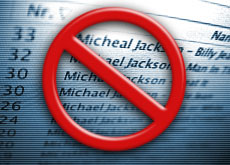Music industry counts the cost of piracy

The Swiss music industry says internet piracy is costing the sector millions of francs each year and is increasing its efforts to stamp it out.
But tracing the perpetrators who – often unwittingly – infringe the copyright laws is no easy matter.
It takes just a few mouse clicks upload or download music to and from the internet and there are many websites offering these services.
But although the practice is proving popular among music fans, the music industry maintains that it is contributing to declining music sales.
A 15 per cent drop in music sales in Switzerland was recorded in 2003, according to the Swiss Anti-Piracy Federation (SAFE).
And last year the global music industry announced a 7.6 per cent fall in sales in 2003 to $32 billion (SFr41 billion) – the steepest decline since the arrival of the compact disc.
SAFE has now appointed inspectors to track down websites or users who are breaking Swiss copyright law.
Tracing offenders
Under Swiss law, anyone found guilty of infringing the copyright laws can be fined up to several thousand francs and, in some cases, may end up in prison.
But experts say it is not easy to trace offenders. One reason for this is the global nature of the internet and the fact that countries have differing copyright laws.
“In general, Swiss legislation applies only to illegal acts committed within our national boundaries”, said Vincent Salvadé, head of the legal department of the Swiss-French branch of the Swiss Society for the Rights of Authors of Musical Works (SUISA).
This effectively means that an Italian site which offers copyright-protected works online and is accessible in Switzerland cannot be prosecuted by the Swiss authorities.
The problem is compounded by the fact that there seems to be a thin line between legality and illegality when it comes to downloading music.
In Switzerland downloading or copying a file from the internet for purely private purposes is allowed and these files may be passed on to friends and family members.
But it is forbidden to set up a website featuring copyrighted music or video material without permission, as is taking part in peer-to-peer networks, which are often used for file sharing.
Finding the perpetrators
Salvadé says it is theoretically possible to use modern technology to identify computers that have been used for illegal downloading.
“Systems that restrict the recording of files from the internet – for example, by preventing the copying of CDs – are being developed, but they are not yet 100 per cent reliable,” said Salvadé.
But experts admit that catching those behind music piracy remains difficult.
“Monitoring every private computer and knowing who uses it is difficult enough,” said Parisima Vez, spokeswoman for SAFE.
“But if the infringement is committed using a public computer, such as in schools or universities, the task becomes virtually impossible,” she added.
Fighting back
The sector has been fighting back. Companies, such as Apple and Sony, have improved their pay-to-play services, effectively making it cheaper to download music from their sites than to buy a complete CD.
Last year Swiss record producers launched a campaign to stamp out the illegal downloading of music on the internet.
The Swiss branch of the International Federation of the Phonographic Industry (IFPI) said it would no longer hesitate to prosecute those engaged in the illegal music trade.
But just how much the downloading of music affects the music industry is still not known.
Experts say there are other factors contributing to declining sales, such as the economic climate and competition from video games and DVDs.
A report published in the United States last year also blamed “a reduction in music variety” and a consumer backlash against the music industry.
swissinfo
Music sales worldwide fell by 7.6% in 2003.
During the same period, sales fell by 15% in Switzerland.
Last year music producers worldwide said they lost SFr41 billion as a result of piracy.
A person can apply for copyright protection for intellectual property.
Music is protected for up to 70 years after the author’s death.
A person wanting to broadcast a copyrighted work must obtain the author’s permission and pay for the privilege.
In Switzerland the rights of almost all music produced worldwide are managed by SUISA.

In compliance with the JTI standards
More: SWI swissinfo.ch certified by the Journalism Trust Initiative

You can find an overview of ongoing debates with our journalists here. Please join us!
If you want to start a conversation about a topic raised in this article or want to report factual errors, email us at english@swissinfo.ch.